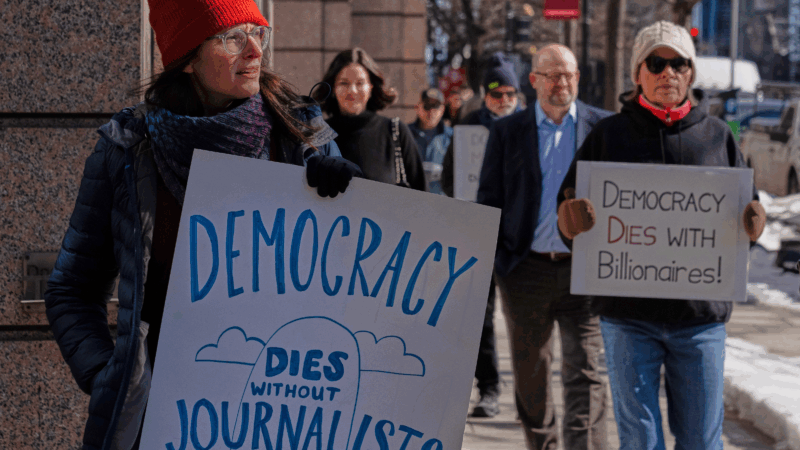Trump tried to fire Corporation for Public Broadcasting board members. Then came DOGE
Less than a day after President Trump attempted to fire three Corporation for Public Broadcasting board members last month, DOGE staffers also attempted to assign a team to review its operations.
CPB leaders denied that request, citing federal law that establishes the independent nonprofit outside of the control of the federal government. The request comes as the president is launching a broad assault against the country’s two largest public broadcasters. At the same time, the informal Department of Government Efficiency has sought to embed itself in numerous independent agencies Trump wants to shutter.
Those revelations come in court documents filed Friday in a lawsuit where CPB is challenging Trump’s April 28 efforts to remove the board members, and after the president issued an executive order May 1 that also purports to end any federal funding to the Public Broadcasting Service and National Public Radio.
According to the filing, Nate Cavanaugh, a DOGE staffer with the General Services Administration sent an email addressed to the two board members not targeted by Trump asking for a meeting just before the initial court hearing in the CPB case.
“I would like to learn more about the Corporation for Public Broadcasting and discuss getting a DOGE team assigned to the organization,” Cavanaugh wrote in an email dated April 29.
An April 30 response from CPB’s executive vice president and general counsel Evan Slavitt reiterated the organization’s stance that federal law states that CPB “will not be an agency or establishment of the United States Government.”
“Accordingly, neither DOGE, the GSA, nor any other component of the executive branch has any role supervising or having any activity relating to CPB,” Slavitt wrote.
Slavitt also said the DOGE email was sent to two email addresses that are only used by CPB’s expense reimbursement system and are not the way to contact board members.
The Trump administration contends the Constitution gives the president “the power to remove personnel who exercise his executive authority,” White House spokesperson Taylor Rogers previously told NPR.
The law appears to say otherwise.
Federal law is explicit about CPB’s structure and independence
In a section of the Public Broadcasting Act of 1967 subtitled “Federal interference or control,” the statute does not allow “any department, agency, officer, or employee of the United States to exercise any direction, supervision, or control over public telecommunications, or over the Corporation or any of its grantees or contractors.”
After Trump issued his executive order claiming to direct CPB’s board to end federal funding to PBS and NPR, leaders of the three organizations said the directive was illegal as well, citing a section of the act that established CPB in a manner “to afford maximum protection from extraneous interference and control.”
The law also says that funds allocated by Congress and distributed by CPB “may be used at the discretion of the recipient,” and spells out what percentage of the funds may be used for public television, public radio at the local and national levels.
Congress allocated $535 million to CPB for the current fiscal year, a number that was left unchanged in the latest stopgap spending plan that all but two Republican lawmakers voted for in March. The president has indicated interest in asking Congress to claw back that funding using a process known as rescission, though that request has not been made and approval is not guaranteed.
The executive order also directs federal agencies to end any “direct or indirect” funding of NPR and PBS. Last week, the Department of Education notified CPB it was terminating its “Ready to Learn” grant for educational television programing.
In asking the court to block Trump’s attempted removal of board members, CPB says it would not have a quorum to conduct any business if the firings were upheld, pointing to a previously-scheduled meeting for Tuesday, May 13 that would include discussing legislative communications plans with Congress, pending and potential litigation, and approving grant awards.
“Without a legally constituted Board, it cannot approve or give direction on any of these matters,” the filing reads.
And though CPB says it is not subject to the president’s authority, it is worth noting that without a quorum, the board would also be unable to enact Trump’s executive order allegedly seeking to defund PBS and NPR.
The next hearing in the case is scheduled for May 14.
Disclosure: This story was reported and written by NPR reporter Stephen Fowler and edited by Padmananda Rama, Emily Kopp, Vickie Walton-James and Gerry Holmes. Under NPR’s protocol for reporting on itself, no corporate official or news executive reviewed this story before it was posted publicly.
Have information you want to share about DOGE access to independent agencies? Reach out to this author through encrypted communication on Signal. Stephen Fowler is at stphnfwlr.25. Please use a nonwork device.
Pentagon says it’s cutting ties with ‘woke’ Harvard, ending military training
Amid an ongoing standoff between Harvard and the White House, the Defense Department said it plans to cut ties with the Ivy League — ending military training, fellowships and certificate programs.
‘Washington Post’ CEO resigns after going AWOL during massive job cuts
Washington Post chief executive and publisher Will Lewis has resigned just days after the newspaper announced massive layoffs.
In this Icelandic drama, a couple quietly drifts apart
Icelandic director Hlynur Pálmason weaves scenes of quiet domestic life against the backdrop of an arresting landscape in his newest film.
After the Fall: How Olympic figure skaters soar after stumbling on the ice
Olympic figure skating is often seems to take athletes to the very edge of perfection, but even the greatest stumble and fall. How do they pull themselves together again on the biggest world stage? Toughness, poise and practice.
They’re cured of leprosy. Why do they still live in leprosy colonies?
Leprosy is one of the least contagious diseases around — and perhaps one of the most misunderstood. The colonies are relics of a not-too-distant past when those diagnosed with leprosy were exiled.
This season, ‘The Pitt’ is about what doesn’t happen in one day
The first season of The Pitt was about acute problems. The second is about chronic ones.







